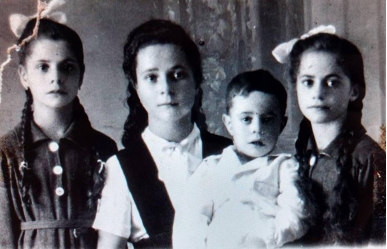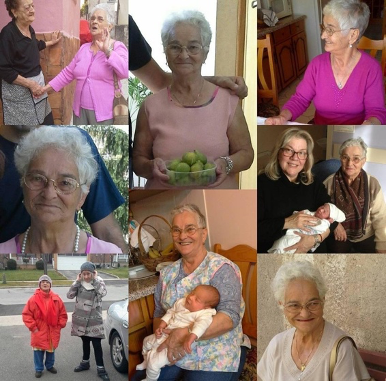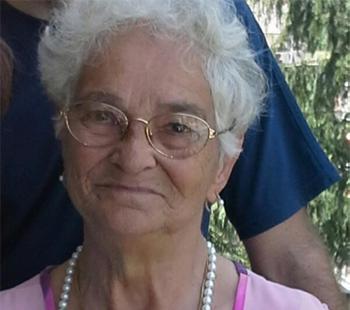As written by her granddaughter Elizabeth Videka-Beaulieu
I want to share a story with you. While it is not directly my story, it is a story that has shaped my own. Without this story, I would not have mine. I remain forever humbled by my privilege to have heard this story first hand in 2009, and it is my honor to retell it, today.
Carmella Caruso-Filicetti. My nonna. My person. She was born and raised in Celico, in the province of Cosenza, in southern Italy. Born in 1936 , she became the eldest of four. First, the twins, Concetta and Rosie, then her brother, Sam. When asked about what life was like growing up in Italy, Nonna insisted that there was nothing very significant about where she grew up. It was during the depths of La Miseria, where jobs were scarce and poverty was widespread.

Her father had gone to Canada for work in 1951, leaving her with her mother and three younger siblings. At fifteen, Nonna met her husband, Frank Filicetti. He lived a house away and she was smitten by his charm. When her aunts discovered she was mingling with a “Filicetti”, they were furious and convinced her mother that something had to be done to keep them apart.
With five sister-in-laws sitting on her shoulders, Nonna’s overwhelmed mother allowed them to step in and take care of the situation as they saw fit. The “5 witches”, as Nonna would recall, years later. In their cruelty, they had Nonna sent to another town, to be kept away from Nonno, and in doing so, away from her siblings and mother. Nonno found out where she was staying and sent her letters. Then one day he went to see her. Her aunts found out what was happening, despite their disapproval. To keep her from leaving with my Nonno, Carmella’s uncle tied her to the fence. Desperate to be with Frank, Carmella said what she had to, to finally be released and be with him. Unfortunately, that led to her ostracization from the entire family.
In 1954, at the age of 18, Carmella provided me with one of my greatest gifts- Emilia- My mother. With the family in Italy no longer speaking with her, jobs becoming obsolete and her family already there, Nonna and Nonno decided to immigrate to Canada. Frank had to work as a brick layer and save for sixteen months for the $300 they’d need in addition to the $200 given to them by relatives. Her mother had broken her silence to say goodbye to Carmella a year earlier, when she and the siblings made the move to be with her father. The hardest part about leaving Italy, Nonna had always said, was leaving her Nonna behind. Her Nonna was too old and sick to take the journey overseas, and passed two months after Carmella arrived in Canada.
With a sixteen month old and two trunks in tow that contained her blankets, some plates, a coffee maker, and cutlery, Carmella and her husband left for Canada. The three of them traveled by ship for 9 days, and Nonna spent the entire time violently ill from a recent oil paint job that had been done on one of the ship levels. They landed in Halifax and spent another 2 days traveling by train to Ontario.
What they arrived at was an instant shock. They moved into a house with an aunt and four others. They paid her aunt $9 a month to live in a small room upstairs and share a small kitchen with 5 other people. Nonna slept on a cot with her baby. Her spirits were broken by the reality of her new life. It was cold, strange and cramped. She said that if she had the money, she would have turned around and headed right back to Italy that first night.
A year after arriving in Canada, my Nonna, Nonno and mother moved in with her mother and siblings in a bungalow, where they lived in the kitchen and slept on a cot for five years. During this time, both Carmella and her husband worked full-time.
Nonna first worked at the Mattel toy factory where she said all the Italian immigrants went to work. She worked at Mattel for four months and never saw a penny, as a fire was said to have destroyed all the documents. She ended up working at Atlas Radio Components. Her position at the factory was on the line, soldering minute radio parts. Part of her job required her to work a foot pedal press repeatedly, which ultimately resulted in her suffering a pinched nerve in 1976, having to undergo back surgery, and ending her ability to work. She attended my mothers wedding ceremony in crutches and had to lay on a lawn chair for the duration.
While she had always insisted that she loved being in Canada and had no desire to return to Celico, a place heavy with the trauma of her youth, it would be untrue to describe her life post-immigration, as easy.
Nonna bore the silent pain she endured, on her body, in addition to her heart, and at the end of the day, that pain was all she had left to try and cushion my mother from the harsh realities of life. Shortly after arriving in Canada, Emilia, my mother, developed jaundice and was hospitalized for two weeks in Toronto. Because her mother and father could not miss work, my mothers aunt and uncle took her to be admitted. When Nonna went to finally pick up my mother, my mother did not recognize her. And life went on.
My mother was 12 when her brother was born. Until the morning her mother went to the hospital, in labor, my mother did not even know that a new family member was on his way. She recalls being surprised the morning of her brother’s birth, because her mother never took a day off work, so for her to be home was alarming. That was when she was told she’d be getting a sibling. My nonna went to the hospital and was alone. When it was clear that she would not be able to deliver her son, the doctors called her husband to get his consent to perform a c-section. She was alone.
Following the birth of her son, Frank Jr. in 1967, Nonna had to have a hysterectomy, as she had developed a tumor the size of a grapefruit. Two years after her hysterectomy, in 1970,she had her tumorous thyroid removed. And still, she worked for six more years, until her back injury. She developed gum disease and had all of her teeth pulled. The physical scars ran deep for nonna, but the most painful scars were those she held inside.
After living in Canada for six years and spending $10 a week on everything, including her shoe polish, Nonna and her family purchased their own piece of land. When her brother-in-law and his new wife needed a place to begin their life, Nonna rented a section of the house to them. Living in close quarters with so many different people, in such a short amount of time, there is bound to be tension and frustration amongst inhabitants. This is a reality of life. However, when you feel abandoned by the world, it doesn’t take much perceived betrayal to uproot years of trauma and pain.
Living in Italy, Nonna never felt accepted as she was, loved for who she was, by the very family she so adored. Working in Canada, she never felt like enough. She’d watch other workers advance to better jobs at General Electric, because their English was better than hers, and each time she was referred to as a “wop”, she was reminded that she was an “other”.
When the alienation began to grow within her own walls at home, the isolation became all encompassing. For every grievance she’d endure with her in-laws, her husband would become accusatory rather than empathetic. He’d piggyback on the points of his brother and the pain of this perceived rejection by the man who she gave up everything for, who sent her love letters, who she got tied to a fence, berated, ostracized for…..where do you turn when nowhere feels like home, when no one feels safe?
My mother found her mother collapsed on her bed, unconscious. She had swallowed a bottle of pills.
Was she actually hoping to never wake up? Knowing my nonna in the intrinsic ways I did, the ways that surpassed language and cultural norms and simple words, I don’t think she did. I think she genuinely wanted to rest. I think she wanted it all to just stop for a little while, so she could catch up. I think she wanted to reduce the weight she carried on her shoulders, that excruciatingly heavy weight that she’d been lugging since she was a child, for just a few minutes.
When I think of the silence that is present in her experience as a woman, a mother, an immigrant- this memory that is not mine to have witnessed, but to have felt, generations later, is what immediately comes to mind. She was furiously silent in her struggles.

Decades later, Nonna became one of the most important women in my world. I was her first grandchild, and the bond her and I shared was undeniable. Despite not ever feeling like she was loved by her own, unconditionally, she damn well knew how to radiate that love. She loved me with every fiber of her being, and her fierce silence became deafening as she neared the end of her life.
I could continue ad nauseam about the ways in which she displayed her strength, so I will leave you with this final act of ownership that Carmella took over her life, after her death. In what I continue to believe was her unleashing of a scream that was contained for 80 years of her life, Nonna met with a funeral home director. She brought the photo she wanted used for her viewing, selected the flowers, and the coffin. She paid in full. No one knew.
When both my mother and I suspected something was happening with her, physically, Nonna finally let go and broke her silence. She was diagnosed with cancer in her liver, which was suspected to be secondary, though the first area remains unknown. She was diagnosed in November of 2016 and passed on February 24, 2017 at 21:04.
In the hour before she died, a newborn was crying in the family area. Why a newborn was crying in the palliative care unit at that moment is something I can never answer. What I do know is that it was a necessary reminder of the cycle of life and the passing of energy from one to another. Energy is never erased. It never ceases to exist. It changes. Hearing is the last sense to go, just as it is the first to develop in the womb. They can hear. That is why they say to speak to the dying while they are in their womb. They can hear. I thanked her for loving me unconditionally.
To have been a recipient of that, is all I could have asked for in this life. Her oxygen sounded like a waterfall bubbling, another reminder of the absurdity that is life. We are all rivers. Always changing while remaining the same. “That’s-a tha life, Lizabetta”, she’d always say. She was there for the beginning of mine, and I was there for the end of hers.
The day after her funeral, my husband, daughter and I moved to a new city. My husband, my daughter, and myself. A year to the month that my Nonna was diagnosed with cancer, my mother was diagnosed with stage 2 breast cancer. I was unexpectedly pregnant with my second daughter after struggling to get pregnant with my first, three years prior. I gave birth to Isabella Carmella on February 9. A year to the month that nonna died. That was one of the hardest years of my life. 2 days after giving birth, my mom went for a lumpectomy and shortly after, began chemotherapy (which she completed successfully- she is in remission). There I was, in a new city, without my mom, without my nonna….and just like I do now when I feel like there is no way I can get through what life brings, I thought of her. I thought of Nonna and her life, her journey, her silent story that I am proud to finally speak aloud.
Written by Elizabeth Videka-Beaulieu
